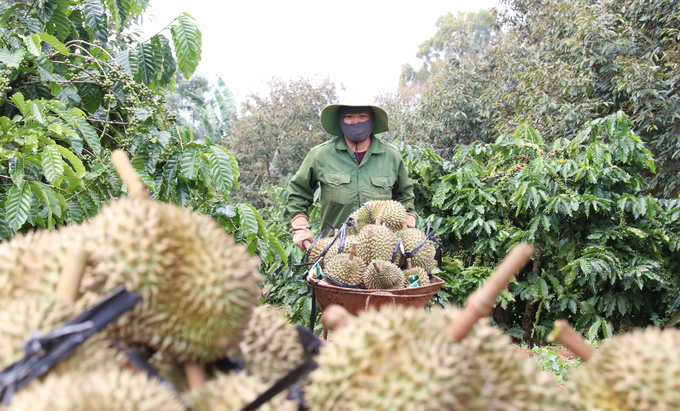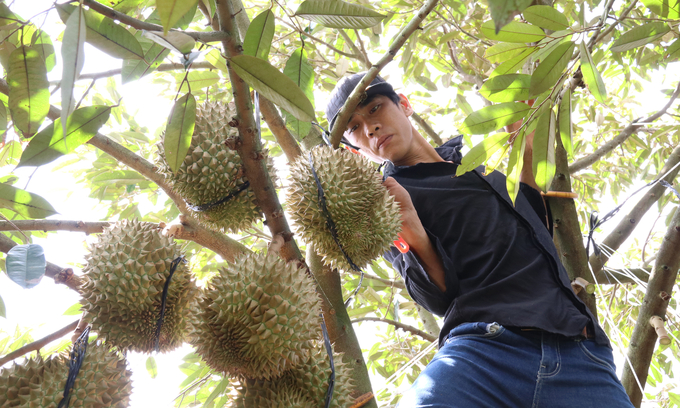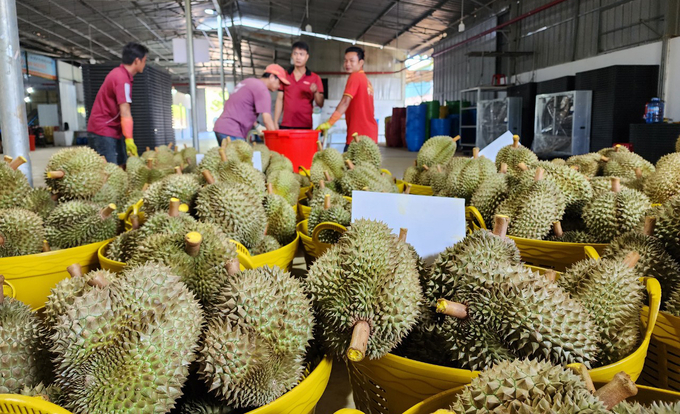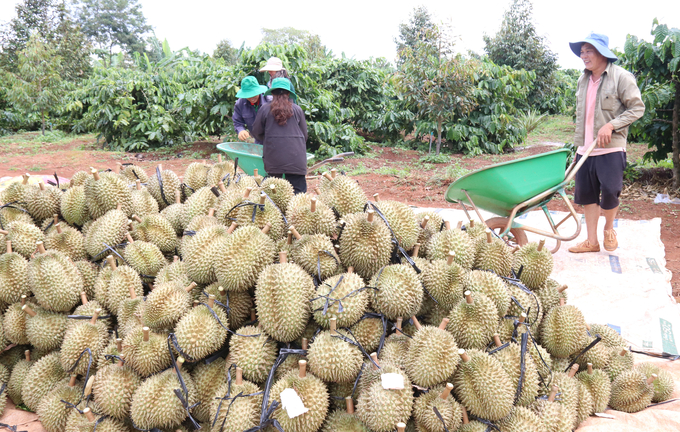May 17, 2025 | 17:11 GMT +7
May 17, 2025 | 17:11 GMT +7
Hotline: 0913.378.918
May 17, 2025 | 17:11 GMT +7
Hotline: 0913.378.918

When the market price surpasses the signed contract price with businesses, farmers are willing to forfeit their deposits. Photo: Quang Yen.
Ban Me Green Farm Joint Stock Company in Dak Lak province signed a contract with a Chinese partner to export 3,000 tons of fresh durian. Ban Me Green Farm Company has cooperated with local cooperatives in developing production unit codes and technical instructions in order to acquire high-quality products that comply with regulations imposed by the importing country. However, when the market price surpasses that of the contracted price after harvest, farmers are willing to forfeit their deposits, severely affecting the company.
According to Ms. Nguyen Thi Thai Thanh, Chairwoman of the Board of Directors of Ban Me Green Farm Joint Stock Company, the local supply chain of export raw materials for durian products has suffered greatly in the last few months.
The company initially provided farmers and cooperatives with support in establishing production unit codes and technical instructions. However, when durian prices surge at the end of the season, farmers fail to keep their commitments to the company.
"The company and farmers initially entered into contracts with prices ranging from 65,000 to 75,000 VND per kilogram at the beginning of the season. As supply drops and price rises, farmers fail to deliver on these commitments. They forced businesses to raise the contracted price by 5,000 to 7,000 VND. This is a forfeiture of deposits as well as a breach of contract.
As a result, businesses were forced to raise prices in order to maintain the partnership. This breach of contract affects delivery plans with our partners in China and other countries around the world. Additionally, businesses were forced to immediately procure materials from other sources due to a sudden shortage. This causes a turmoil in both quality and price", Ms. Thanh emphasized.
Moreover, the disrupted connection between farmers and businesses has significantly affected the crop. On the other hand, a team of brokers greatly influenced the price and quality of durian.
“Despite the lack of knowledge regarding durian farming techniques, the brokers seek out durian farms to establish artificial prices. There are ten days left in the main season in Dak Lak province so businesses have stopped purchasing and packaging for five to seven days. Several businesses have reduced their output by up to two-thirds. These efforts will help reduce the price of input materials and stabilize market prices", Ms. Thanh added.
According to Ms. Thanh, businesses are informed that durian prices in the Chinese market range from 109,000 to 120,000 VND per kilogram. As a result, the current Vietnamese durian price of 90,000 VND per kilogram is too high.

The disrupted connection between farmers and businesses has a significant impact on the overall yield of the crop. Photo: Quang Yen.
“Export businesses cannot meet market prices so they stop buying. When harvest season approaches, brokers will convince farmers to forfeit their deposits, which can lead to a significant loss in the value of their durians.
Businesses have requested local governments and media agencies to educate farmers on the market. Farmers need to determine the value of their products in order to maintain a sustainable market and reliable connections", Ms. Thanh highlighted.
According to Ms. Nguyen Thi Huong from G1 Vietnam Brand Trading Co., Ltd., farmers "stealing" durians from their farms and selling them when the price is high is a problem her business recently encountered.
This activity has caused heavy losses to the company due to their signed contracts with partners regarding output.
“When farmers steal crops to sell, we will have fewer products to export to our customers. We initially agreed on the price of 55,000 to 60,000 VND per kilogram. However, when we announced that we would increase the price in response to the rising market price, farmers still quietly harvested 15 tons of durian from their farms. As a result, there were no fruits left when we arrived at the farm for the harvest season", Ms. Huong shared.
Despite a signed contract with farmers, it was not notarized. As a result, a lawsuit would not be a viable option for the company. Businesses are forced to accept their losses with no alternatives.
Mr. Pham Tuoi, Director of the Lan Tuoi Agricultural Trade and Service Cooperative in Buon Ho town, noted that the high prices of durian have limited the cooperatives compared to the previous year.
According to Mr. Tuoi, the current durian price is nearly 100,000 VND per kilogram so export businesses are unable to profit. “Durian prices in the Chinese market currently fluctuate around the 100,000 VND mark. Businesses are suffering from heavy losses due to the high costs and low product quality. Due to the unpredictability of prices, businesses only export between five and ten containers to Chinese partners. The cooperative has incurred significant losses as a result of our contracts with farmers for high prices since the beginning of the season. There are also drifting goods as a result of the insufficient export output", Mr. Tuoi reported.

Businesses currently lose money the more they export because durian prices are currently higher than demand. Photo: Quang Yen.
According to Mr. Tuoi, the current price is artificially inflated compared to actual demand. Export businesses can only profit at a floor price of 70,000 VND per kilogram. However, the majority of traders ask for a price between 80,000 and 90,000 VND per kilogram.
According to Mr. Vu Duc Con, Deputy Director of Dak Lak province's Department of Agriculture and Rural Development and Chairman of the Dak Lak Durian Association, the province currently has considerable price fluctuations compared to previous years. At the beginning of the durian harvest, the province encountered two major issues.
Namely, farmers are willing to forfeit their deposits, which results in heavy losses for businesses. The forfeiture of deposits causes a shortage of exports to Chinese partners. As a result, the Chinese partners will find other supply sources, which will affect the reputation of domestic businesses and the industry.

At the beginning of the durian harvest, Dak Lak province encountered two major issues. Photo: Quang Yen.
Secondly, the high prices will reduce the purchasing capacity of local businesses. This will lead to a degradation in the quality and travel distance of the harvested durian. In addition, the high-quality durians will sold by businesses whereas the remaining will be discarded.
“Farmers and businesses need to negotiate and offer reasonable prices when the prices drop. This will reduce damage to both parts. If all parties insist on their views, farmers will suffer heavily", Mr. Con explained.
From 8:00 a.m. to 11:45 a.m. on September 11, Vietnam Agriculture Newspaper; Department of Plant Protection; Department of Quality, Processing and Market Development; Dak Lak province's Department of Agriculture and Rural Development and Dak Lak Durian Association jointly organized the Forum on "Addressing the state of durian consumption linkage and export in 2023, and solutions for effective and sustainable development of Vietnam's durian industry".
Location: Saigon - Ban Me Hotel, No. 1 - 3 Phan Chu Trinh, Thang Loi Ward, Buon Ma Thuot City, Dak Lak Province. Also online on 1,000 connection points nationwide.
Participants: Representatives from the Ministry of Agriculture and Rural Development: Department of Economic Cooperation and Rural Development; Department of Crop Production; Legal Department; Vietnam SPS Office; Center for Digital Transformation and Agricultural Statistics; Vietnam Chamber of Commerce and Industry, local Departments of Agriculture and Rural Development in durian production areas, central and local press agencies.
You can attend the forum online via Zoom ID: 921 5055 3574; Password: 230911
Translated by Nguyen Hai Long

(VAN) In the face of counterfeit and imitation products, Khanh Hoa Salanganes Nest Company hopes for the prompt completion of the legal framework, strict enforcement against violations, and protection of the bird’s nest brand.

(VAN) Japan's efforts to lower the price of rice through the release of its stockpile may finally be making some progress, albeit at a snail's pace.

(VAN) U.S. tariffs are not only a 'shock', but also an opportunity for Vietnamese businesses to renew their mindset toward comprehensive development.

(VAN) As Bac Giang lychee enters the harvest season, Minister Do Duc Duy expects that the fruit will contribute greatly to agricultural exports due to standardized production and deep processing.

(VAN) Consumers have shown a preference for free-range eggs, but those farming systems are more vulnerable to biosecurity risks like bird flu.
/2025/05/09/5701-1-184335_301.jpg)
(VAN) Vietnam’s eel exports nearly doubled thanks to a mud-free farming model, opening up new prospects while still facing numerous barriers related to international standards.

(VAN) Minister Do Duc Duy warned that if production is not professionalized and supply chains are not transparent, the U.S. market could become a growth bottleneck.